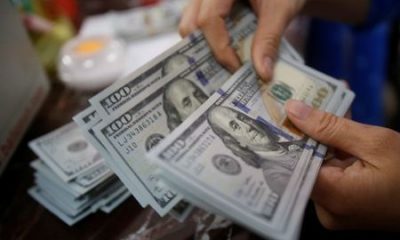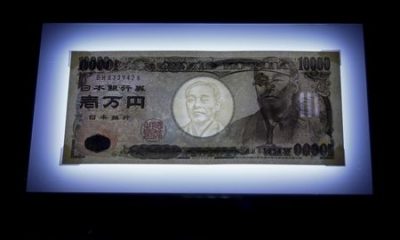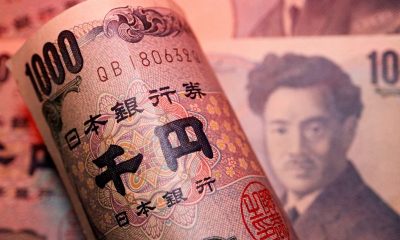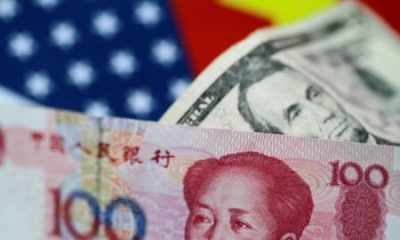Commodities
Bloomberg: ship owners began to buy crude oil tankers in winter

The owners of crude oil tankers began to buy in large quantities vessels capable of transporting goods in icy waters. According to Bloomberg, this includes ships for the carriage of Russian raw materials.
“About $1 billion was spent on used ice-class tankers between May and August, about five times more than a year earlier,” according to British company E.A. Gibson Shipbrokers Ltd.
During the period from May to August 2022. 42 tankers were sold in ice class. Most of the deals were made by companies from China, Turkey, and the United Arab Emirates. Ice-class ships are suitable for transporting Russian oil, said Richard Matthews, head of the firm’s research group.
“Companies that intend to facilitate Russian exports in the winter will need ice-class ships,” he said.
By comparison, shipowners purchased a total of only 12 oil tankers during the same period in 2021. Such a spike in purchases of tankers this year is connected with concerns about oil transportation in the conditions of international sanctions against Russia. Countries of the European Union are planning to prohibit imports of Russian raw materials by sea from December 5.
On September 12, Minister of Mining and Energy of Serbia Zorana Mihajlovic stated that the Balkan country would no longer be able to buy Russian oil from November 1, due to European Union sanctions. As an alternative, she allowed the supply of Iraqi raw materials. According to the minister, before the European sanctions, the republic used to buy 25% of its oil from Russia; 20% was produced from the Serbian deposits; the rest came from the oil from the Iraqi city of Kirkuk.
Earlier, we reported that food prices in the world remained high despite the grain deal.
Commodities
Oil set for third weekly decline, pressured by Gaza ceasefire hopes

By Laila Kearney and Georgina McCartney
LONDON (Reuters) -Oil prices slipped on Friday and were on track for a third consecutive weekly decline, pressured by muted demand in China and hopes of a Gaza ceasefire deal that could ease Middle East tensions and accompanying supply concerns.
futures for September dipped 56 cents to $81.81 a barrel by 1250 GMT. U.S. West Texas Intermediate crude for September fell 40 cents to $77.88.
For the week, Brent is trading down almost 1% while WTI is down more than 2%.
Recent data, such as July 20 figures showing that China’s total fuel oil imports dropped 11% in the first half of 2024, have raised concern about the wider demand outlook in China.
In the Middle East, hopes of a ceasefire in Gaza have been gaining momentum.
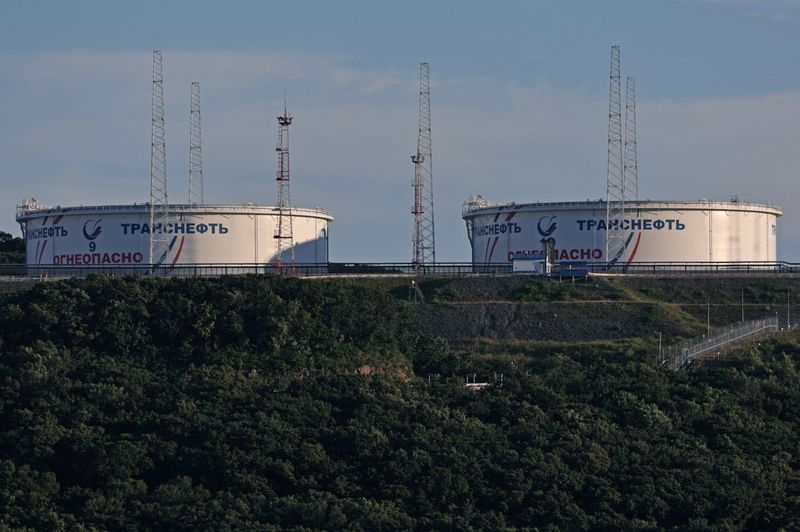
A ceasefire has been the subject of negotiations for months, but U.S. officials believe the parties are closer than ever to an agreement for a six-week ceasefire in exchange for the release by Hamas of female, sick, elderly and wounded hostages.
Oil price declines were capped, however, by threats to production from Canadian wildfires, a large stocks draw and continued hopes of a September cut to U.S. interest rates after strong economic data, said PVM oil analyst Tamas Varga.
Commodities
Oil prices fall; set for weekly losses on demand concerns

Investing.com– Oil prices fell Friday, on course for a third consecutive losing week as concerns over sluggish demand conditions in Asia weighed.
At 09:00 ET (13:00 GMT), fell 0.9% to $81.62 a barrel, and dropped 0.8% to $77.66 a barrel.
Crude set for third straight week of losses
Both benchmarks are on course for another losing week, the third in succession, with down just under 1% and WTI nearly 3% lower.
Persistent concerns over slowing growth and demand in top importer China have been the dominant factor, part triggered by GDP data from last week, which showed the Chinese economy grew less than expected in the second quarter.
Additionally, more data this week showed the country’s apparent oil demand fell 8.1% to 13.66 million barrels per day in June.
Beijing unexpectedly cut a swathe of lending rates this week, further trying to loosen monetary policy amid growing concerns over sluggish growth.
Apart from China, uncertainty over Japan also grew following middling , while weak activity data in Europe also pointed to economic woes.
Gaza ceasefire in focus
Also weighing on the crude market have been increasing hopes of a ceasefire in Gaza.
The leaders of Australia, New Zealand and Canada called for an immediate ceasefire in a joint statement on Friday, while U.S. Vice President Kamala Harris has pressed Israeli Prime Minister Benjamin Netanyahu to help efforts at reaching a deal, striking a tougher tone than President Joe Biden.
A ceasefire has been talked about for months, but if it was to occur then some of the risk premium could be removed from the market.
Strong US GDP, rate cut hopes offer some support
On the flip side, data, released on Thursday, showed that the U.S. economy grew more than expected in the second quarter, despite pressure from high rates and relatively sticky inflation.
The reading drove up hopes that the world’s biggest fuel consumer was headed for a “soft landing,” where economic growth remained steady while inflation eased.
These hopes were also lifted by the data showing overall U.S. inflation cooled as expected in June.
According to data from the Bureau of Economic Analysis, the (PCE) price index slipped to 2.5% in June, from 2.6% the prior month. .
Stripping out volatile items like food and fuel, the year-on-year “core” gauge, widely known as the Fed’s preferred gauge of inflation, remained at 2.6%, only marginally above the Federal Reserve’s 2% target.
This sparked increased optimism over a potential interest rate cut by the Federal Reserve in September.
Data showing steady drawdowns in U.S. also offered some positive cues to oil markets, as fuel demand in the country remained robust amid the travel-heavy summer season.
(Ambar Warrick contributed to this article.)
Commodities
Canadian wildfire reaches Jasper, firefighters battle to protect oil pipeline

(Reuters) -A wildfire reached the Canadian town of Jasper, Alberta on Wednesday, one of hundreds ravaging the western provinces of Alberta and British Columbia, as firefighters battled to save key facilities such as the Trans Mountain Pipeline, authorities said.
Wildfires burning uncontrolled across the region include 433 in British Columbia and 176 in Alberta, more than a dozen of them in the area of Fort McMurray, an oil sands hub.
The pipeline, which can carry 890,000 barrels per day (bpd) of oil from Edmonton to Vancouver, runs through a national park in the Canadian Rockies near the picturesque tourist town, from which about 25,000 people were forced to evacuate on Tuesday.
“Firefighters … are working to save as many structures as possible and protect critical infrastructure, including the wastewater treatment plant, communications facilities, the Trans Mountain Pipeline,” Parks Canada said in a post on Facebook (NASDAQ:).
The pipeline operator did not immediately respond to a Reuters request for comment, but said earlier it was safely operating the pipeline and had deployed sprinkler protection as a preventive measure.
In the day’s last update, Jasper National Park said it could not report on the extent of damage to specific locations or neighbourhoods, and that it would provide further updates on Thursday.
Canadian Prime Minister Justin Trudeau said his government approved Alberta’s request for federal assistance.
“We’re deploying Canadian Armed Forces resources, evacuations support, and more emergency wildfire resources to the province immediately – and we’re coordinating firefighting and airlift assistance. Alberta, we’re with you.”
The town, and the park, which draws more than two million tourists a year, were evacuated on Monday night, at a time when officials estimated there were 15,000 visitors in the park.

Deteriorating air quality forced firefighters and others lacking breathing equipment to evacuate to the town of Hinton, about 100 km (62 miles) away, park authorities said on Facebook on Wednesday evening.
Officials of Parks Canada earlier said they expected rain to arrive overnight.

 Forex2 years ago
Forex2 years agoForex Today: the dollar is gaining strength amid gloomy sentiment at the start of the Fed’s week

 Forex2 years ago
Forex2 years agoHow is the Australian dollar doing today?

 Forex2 years ago
Forex2 years agoUnbiased review of Pocket Option broker

 Forex2 years ago
Forex2 years agoDollar to pound sterling exchange rate today: Pound plummeted to its lowest since 1985

 Cryptocurrency2 years ago
Cryptocurrency2 years agoWhat happened in the crypto market – current events today

 World2 years ago
World2 years agoWhy are modern video games an art form?

 Stock Markets2 years ago
Stock Markets2 years agoMorgan Stanley: bear market rally to continue

 Economy2 years ago
Economy2 years agoCrude oil tankers double in price due to EU anti-Russian sanctions

